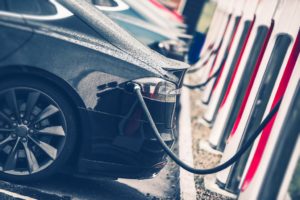Clean Energy Canada | As electric cars turn transportation upside down, Canada is looking the other way: report
December 14, 2017

VICTORIA—The global shift to electric cars is well underway, bringing with it big changes for drivers, industries and governments around the world.
But as our peers accelerate, Canada is coasting—on both policy and per-capita sales. In 2016, just 0.6 per cent of car sales in Canada were for electric vehicles, well behind the U.S., U.K., China and other world-leading nations (Norway’s market share is a whopping 28.8 per cent). And it’s not for lack of interest: Canadians must wait months to get their hands on new EVs when they hit the market.
The good news is Ottawa’s forthcoming national Zero-Emissions Vehicle Strategy could help us catch up—but only with the right design. With a proper EV strategy, Canada can capitalize on opportunities to innovate, to make our economy cleaner and more competitive, to reduce pollution—and its public health and climate change impacts—and to export our metals and minerals to a growing global market.
Clean Energy Canada’s new report, Stuck in Neutral, examines the EV market at home and abroad, putting forward a series of policy recommendations that would help Canada accelerate to the front of the pack. The next big thing in transportation is already here. Now is the time for Canada to speed up and get serious about electric cars.
KEY FACTS
- By 2030, Bloomberg New Energy Finance expects there will be 50 times more electric cars on the road than there are today.
- Falling battery prices—down 73% since 2010—have proven a major EV sales driver.
- Studies have shown that electric cars available in Canada meet 90% of Canadians’ daily driving needs.
- On a per-capita basis, Americans have twice as many plug-in cars as Canadians.
- It’s five times more difficult to purchase an electric car in Canada than in the U.S.
- Currently, Ottawa offers no federal EV incentive (we are one of just two G7 nations without one).
- Canada’s transportation sector is the second-largest source of carbon pollution.
- The shift to EVs will spur significant new demand for the metals and minerals needed for lithium-ion and other battery technologies. Many of these resources are found, produced, and processed in Canada.
QUOTES
“A growing number of Canadians want to choose electric for their next vehicle, and governments and the auto sector have the opportunity to make it easier for them to make that choice. Preserving the status quo is not the same as playing it safe—slow and steady won’t win this race.”
—Merran Smith, Executive Director, Clean Energy Canada
“The electric car revolution will create huge opportunities in mining, in auto-parts and auto manufacturing, in cleantech—areas Canada excels in. An ambitious and strong strategy could make Canada a global EV player, while also reducing pollution.”
—Dan Woynillowicz, Policy Director, Clean Energy Canada
SOCIAL MEDIA POSTCARDS (FEEL FREE TO USE)